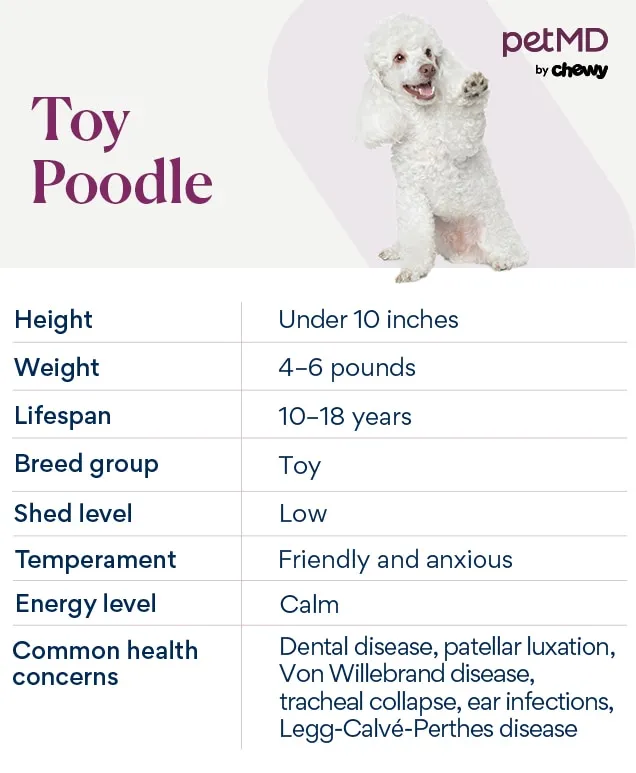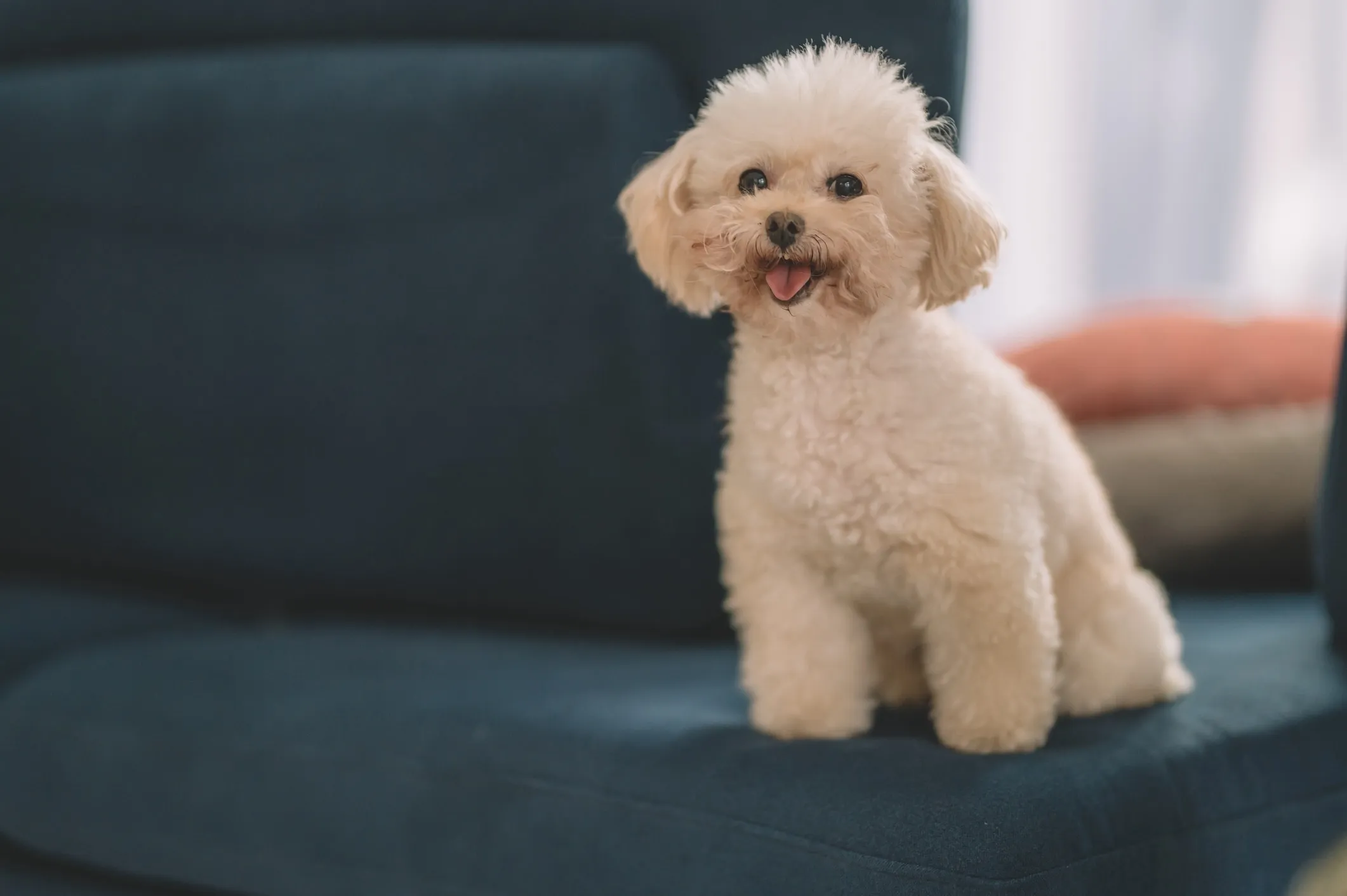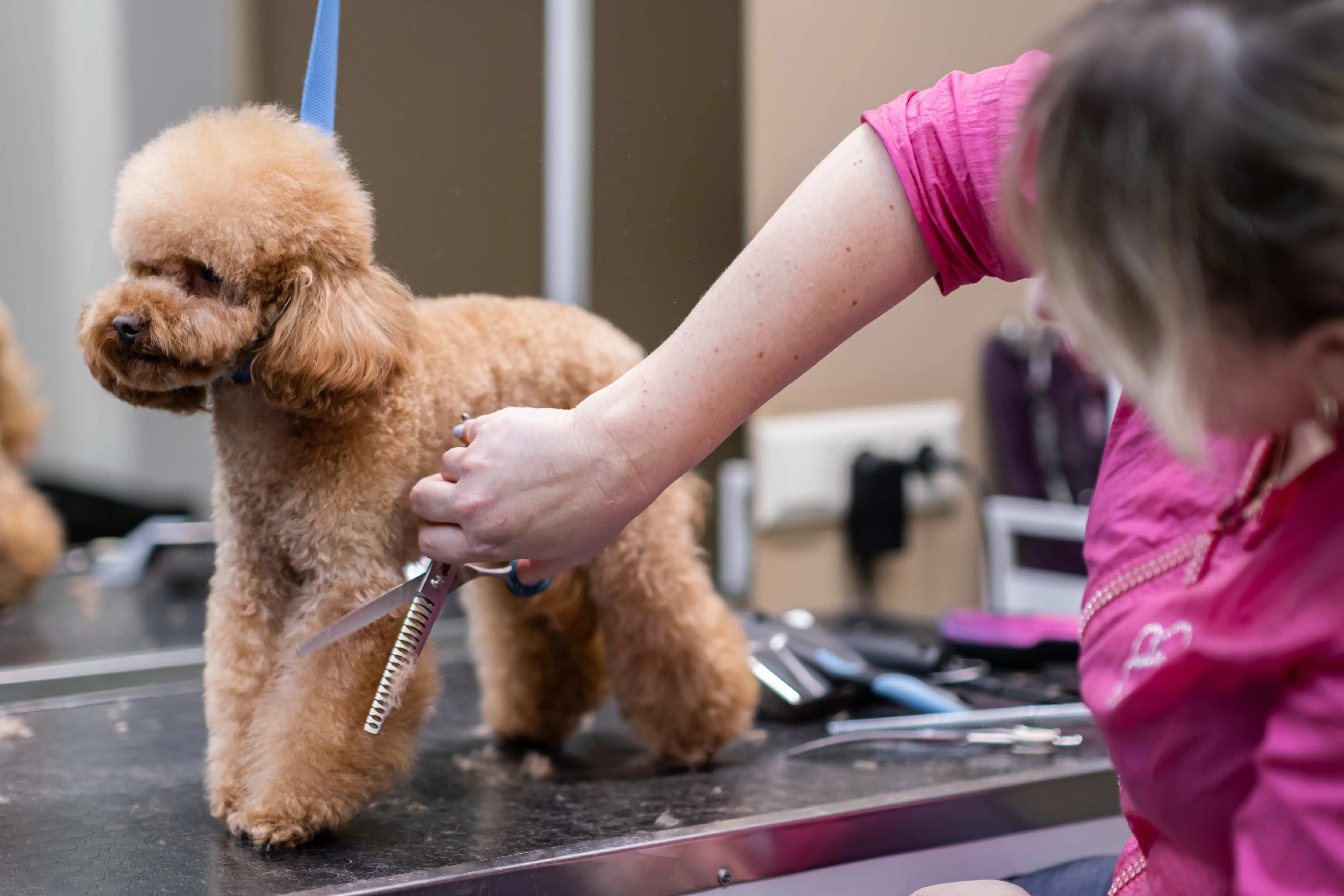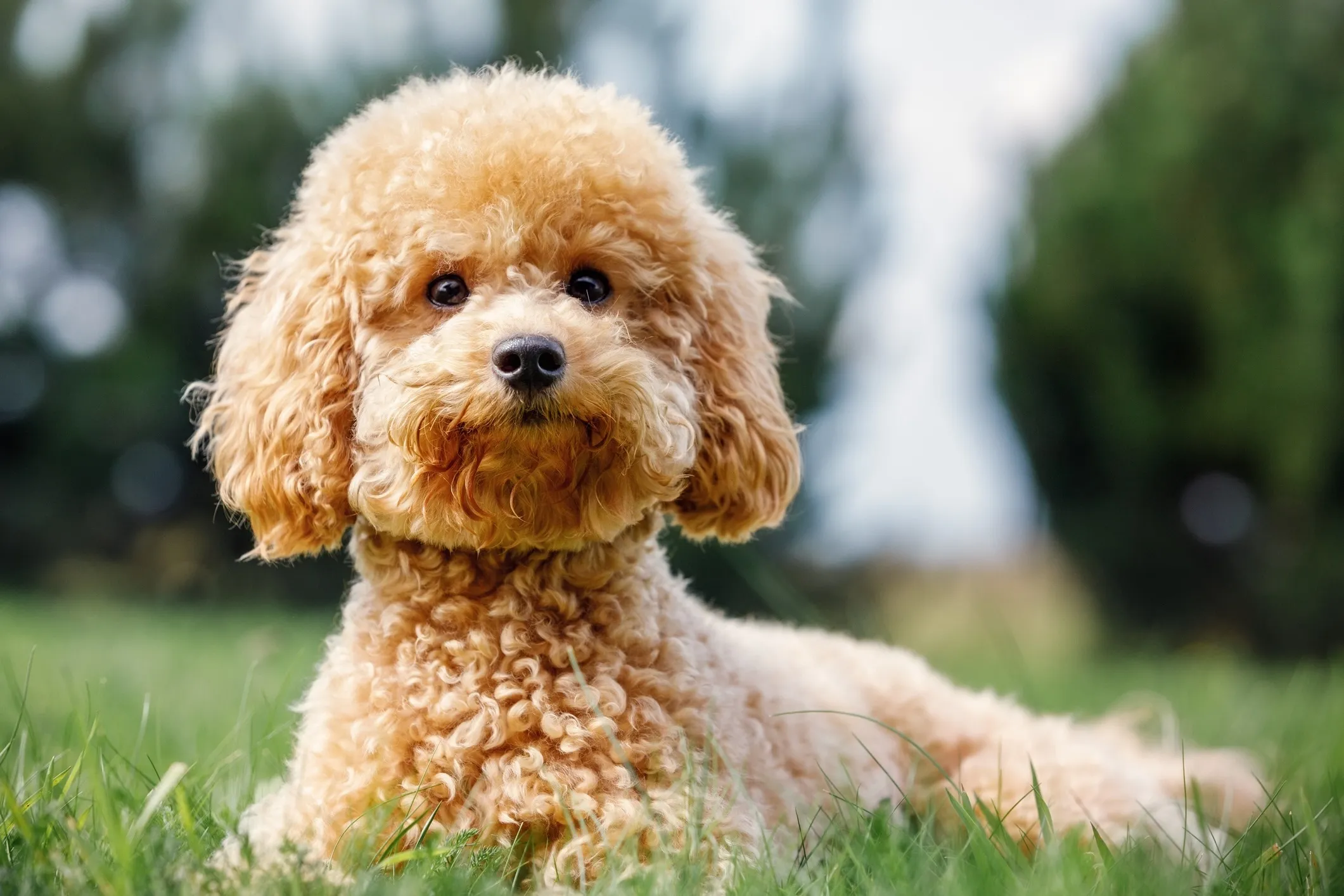The Toy Poodle Dog stands out as one of the most intelligent and captivating canine breeds, offering a huge personality in a small package. Typically standing no more than 10 inches tall and weighing between 4 and 6 pounds, this delightful companion can easily fill any room with its playful and loving presence. While often associated with the elegance of France, the Poodle breed, including the smallest Toy variety, originally hails from Germany, where larger Standard Poodles were historically employed as duck retrievers. Toy and Miniature Poodles have been meticulously bred down from their larger ancestors, a testament to their enduring appeal and adaptability. Whether you’re looking for miniature poodles for sale or simply curious about this remarkable breed, understanding their specific needs is key to providing them with a happy and healthy life.
Caring for Your Toy Poodle Dog: Essential Tips
Toy Poodle dogs are more than just their adorable appearance; they make truly exceptional family pets. Their remarkable intelligence and inherent desire to please their owners contribute to their reputation as one of the easiest breeds to train. Unlike many larger, more energetic breeds, Toy Poodles have relatively modest exercise requirements. However, they still thrive on consistent physical activity, benefiting significantly from a daily walk and engaging play sessions at home. These activities are crucial not only for their physical health but also for their mental well-being, helping to channel their keen minds.
Poodles across all sizes are renowned for their distinctive curly coats, which demand significant grooming attention. This unique coat grows continuously and sheds very little, making regular trimming an absolute necessity. Owners should plan for professional grooming every four to six weeks to keep their Toy Poodle looking its best and to prevent matting. While no dog is entirely “hypoallergenic,” the low-shedding nature of the Toy Poodle dog’s coat can make them a more suitable choice for some individuals with allergies. Prospective owners with sensitivities are always advised to spend time with the breed before committing to bringing a Toy Poodle puppy home to ensure compatibility.
 A detailed chart depicting the key characteristics of a Toy Poodle dog, including its size, lifespan, and common traits.
A detailed chart depicting the key characteristics of a Toy Poodle dog, including its size, lifespan, and common traits.
Common Health Issues in Toy Poodle Dogs
The typical lifespan for a Toy Poodle dog ranges from 10 to 18 years, a testament to their generally healthy disposition. However, throughout their long lives, these small dogs are predisposed to a few specific health conditions that may necessitate veterinary care. Pet parents may find it beneficial to consider investing in pet insurance early in their Toy Poodle’s life to help manage potential treatment costs. Reputable Toy Poodle breeders play a crucial role in safeguarding the health of the breed by screening their breeding dogs for many inherited conditions, thereby helping to ensure they produce healthy puppies. Further insights into a Toy Poodle’s genetic health can be gained through dog DNA tests, which can screen for over 230 genetic health conditions.
Progressive Retinal Atrophy
Progressive retinal atrophy (PRA) encompasses a group of inherited eye diseases that lead to the gradual breakdown of photoreceptor cells in the retina. Initially, affected Toy Poodle dogs may experience difficulty seeing in low-light conditions, but the condition typically progresses to complete blindness over time. As PRA is an inherited disease, there are currently no effective treatments available to stop or reverse its progression.
Patellar Luxation
Patellar luxation is a common orthopedic issue in small breeds like the Toy Poodle dog. It occurs when the patella, or kneecap, dislocates from its normal groove in the femur (thigh bone) as the knee flexes. This abnormal movement can cause discomfort and, if left unaddressed, may lead to the development of arthritis in the affected joint. Dogs with patellar luxation may exhibit symptoms such as skipping or running on three legs when the kneecap is out of place. While mild cases may sometimes self-correct, more severe instances can result in the patella remaining dislocated. Treatment options range from joint supplements, fish oils, anti-inflammatory medications, and weight management for mild cases, to surgical intervention for more severely affected dogs.
Legg-Calve-Perthes Disease
Legg-Calve-Perthes disease is a condition primarily affecting young Toy Poodle dogs, typically those under 18 months of age. It involves the breakdown of the head of the femur, likely due to a lack of blood supply to the area, leading to pain and limping. In some instances, the pain can be managed with medications, providing relief for the affected pup. However, in more severe cases where the joint degeneration is significant, surgery to remove the head of the femur may be recommended to alleviate discomfort and improve mobility.
Ear Infections
Toy Poodle dogs are more prone to ear infections compared to many other breeds. These infections commonly arise from an overgrowth of yeast and/or bacteria within the ear canal. Symptoms to watch for include visible debris, redness, an unpleasant odor emanating from the ear, frequent head shaking, and persistent scratching at the ears. If you observe any of these signs, it’s crucial to take your Toy Poodle to the veterinarian for an examination. Most ear infections can be effectively treated with vet-approved ear cleaners and prescription medications, with successful long-term management often involving identifying and addressing any underlying causes, such as allergies. The Poodle’s long ear canals and abundant curly hair can trap moisture and debris, contributing to this predisposition, and carefully trimming (rather than plucking) the hair from the ears may help reduce the incidence of infections. Dogs experiencing chronic or recurring ear infections frequently have allergies that require appropriate diagnosis and management.
 An apricot Toy Poodle dog wearing a harness enjoys a walk in a park, showcasing its compact size.
An apricot Toy Poodle dog wearing a harness enjoys a walk in a park, showcasing its compact size.
Dental Disease
Dental disease stands as one of the most widespread health conditions observed in dogs, particularly in small breeds like the Toy Poodle. It begins with the accumulation of plaque and tartar on the teeth, which subsequently leads to bacterial infection of the tissues surrounding the teeth and beneath the gumline. If left untreated, this can ultimately result in severe tooth and bone decay, causing significant pain and discomfort for your Toy Poodle dog.
The most effective method for preventing dental disease is daily tooth brushing with a toothpaste specifically formulated for dogs. Additionally, certain dental-focused diets, specialized treats, and appropriate chew toys can contribute to the prevention of plaque and tartar buildup. Regular dental cleanings performed by a veterinarian are highly recommended to assess your dog’s oral health, remove accumulated plaque and tartar, polish the teeth, and address or extract any significantly unhealthy teeth. Dental disease is not only a painful condition but can also have detrimental effects on the health of your Toy Poodle’s internal organs if the infection spreads. Regular oral hygiene can also help mitigate issues like tear stains on dogs which can sometimes be linked to overall health.
Tracheal Collapse
Tracheal collapse is a condition where the trachea, commonly known as the windpipe, flattens due to weakened cartilage rings or the sagging of a membrane along its structure. This condition can significantly impede your Toy Poodle dog’s breathing. Symptoms often include a distinctive dry cough, which may intensify when your Toy Poodle eats or becomes excited. While most cases of tracheal collapse are managed with medications to alleviate symptoms and improve breathing, severe instances where breathing is significantly obstructed may necessitate surgical intervention. Toy Poodles are believed to be genetically predisposed to tracheal collapse. To help prevent and manage this condition, it is crucial to maintain your dog at a healthy weight. Furthermore, when taking your Toy Poodle for walks, using a harness or a no-pull head-collar is strongly recommended over attaching a leash to their neck collar, as pressure on the trachea can exacerbate the damage and worsen the condition.
Von Willebrand’s Disease
Von Willebrand’s Disease (vWD) is a genetic blood disorder commonly observed in Toy Poodles. This condition is characterized by a deficiency in the von Willebrand factor, a crucial protein essential for platelets to properly adhere and form blood clots. In dogs lacking sufficient levels of this protein, the blood’s ability to clot is impaired, which can lead to various bleeding episodes, including from the nose, vulva, bladder, or gums. Moreover, Toy Poodle dogs with vWD may experience prolonged bleeding following any trauma or surgical procedure. Due to the possibility that some dogs with vWD may not exhibit notably prolonged bleeding until later in adulthood, measuring blood levels of the von Willebrand factor can be instrumental in confirming a diagnosis. Most veterinarians advise testing for vWD prior to any planned surgeries, such as spays, neuters, or dewclaw removals, to mitigate potential bleeding complications.
Feeding Your Toy Poodle Dog: A Nutritional Guide
Providing your Toy Poodle dog with a diet consisting of commercial kibble or wet food that adheres to the nutritional standards established by the Association of American Feed Control Officials (AAFCO) is an excellent way to guarantee they receive a complete and balanced diet. For Toy Poodle puppies, it is essential to provide a diet specifically formulated for puppies or designated for all life stages to support their rapid growth and development. Adult Toy Poodles, particularly those prone to dental issues, may benefit from dental-focused diets recommended by your veterinarian to help prevent the onset of dental disease.
It is always advisable to consult with your veterinarian to determine the best food tailored to your individual dog’s needs, considering factors like age, activity level, and any specific health concerns. Notably, some reputable brands, such as Royal Canin, even offer specialized dog food formulations specifically designed for Poodle puppies and adult Poodle dogs, addressing their unique breed-specific requirements.
 A small white Toy Poodle dog sits elegantly on a chair, patiently waiting.
A small white Toy Poodle dog sits elegantly on a chair, patiently waiting.
How to Feed a Toy Poodle Dog
Given their small size, adult Toy Poodle dogs generally thrive on two to three feedings per day. However, Toy Poodle puppies require a different feeding schedule. They should be fed three to four small meals daily on a consistent schedule. This frequent feeding is crucial for maintaining stable blood sugar levels in young puppies and effectively preventing hypoglycemia, a potentially dangerous condition common in small breeds if they go too long without food.
How Much Should You Feed a Toy Poodle Dog?
The precise caloric intake recommended for a Toy Poodle dog can vary significantly from one individual to another, depending on several factors including their physical size, metabolic rate, neuter status, and daily activity level. The most accurate way to determine the appropriate feeding quantity for your Toy Poodle is to consult with your veterinarian. They can perform a personalized calculation of your dog’s caloric needs, ensuring they receive adequate nutrition without overfeeding. Additionally, always refer to the feeding guide labels provided on dog food packaging, as they offer valuable information for pet parents. It’s important to remember that in small breeds like the Toy Poodle, calories from treats can accumulate very quickly. Therefore, treats should comprise no more than 10% of your dog’s total daily diet, with the remaining 90% coming from their balanced dog food. For those considering specific dietary needs, such as hill’s prescription heart care dog food, always consult your veterinarian.
Nutritional Tips for Your Toy Poodle Dog
Some Toy Poodle dogs may significantly benefit from the addition of omega-3 fatty acids, specifically DHA/EPA, to their diets. These essential fatty acids are renowned for their potent natural anti-inflammatory properties and play a vital role in supporting the overall health of your dog. Omega-3s contribute to healthy skin and a shiny coat, aid in kidney function, support joint health, and are beneficial for cardiovascular well-being. They can be readily found in various forms, including specialized skin and joint supplements, fish oil supplements, and are also incorporated into some specially formulated dog foods designed to offer enhanced nutritional benefits.
Understanding Your Toy Poodle Dog’s Behavior and Training
As a breed, Toy Poodle dogs are celebrated for their exceptional intelligence and an innate eagerness to please their human families. This combination makes them highly responsive to training and a joy to live with. When properly socialized from a young age, they develop into playful and self-confident companions. While generally possessing a calm demeanor, Toy Poodles absolutely love playtime and regular exercise sessions with their families. The breed is typically gentle with other pets and children; however, due to their tiny stature, all interactions between Toy Poodle dogs and young children should always be closely supervised to prevent accidental injury.
 A brown Toy Poodle dog rests comfortably on a living room floor, with its pet parents seated behind it, indicating a peaceful home environment.
A brown Toy Poodle dog rests comfortably on a living room floor, with its pet parents seated behind it, indicating a peaceful home environment.
Toy Poodle Dog Behavior
Toy Poodle dogs tend to form strong, close bonds with their families. This deep attachment, while endearing, can sometimes lead to the development of separation anxiety if they are left alone for extended periods. They can also be quite sensitive to stress, and sudden alterations in their home environment or routine may manifest as gastrointestinal upset or other behavioral changes. Furthermore, because of their high intelligence, all Poodles, including the Toy variety, require consistent mental stimulation to keep their keen minds engaged and prevent boredom. A bored Toy Poodle dog is more likely to engage in undesirable behaviors such as excessive barking, jumping, or destructive chewing. Keeping your Toy Poodle busy with interactive playtime, engaging puzzle toys, and regular training sessions is essential for their mental well-being and maintaining a harmonious household. If you’re considering bringing home a new companion, perhaps even red mini poodle puppies for sale, understanding their temperament is crucial.
Training Your Toy Poodle Dog
Training a Toy Poodle dog is often a highly rewarding experience for pet parents. Their inherent intelligence, coupled with their strong desire to please, makes them one of the easier breeds to train. As with all successful dog training, the most effective methods are rooted in positive reinforcement. This involves using praise, gentle encouragement, and tasty, high-value treats to reward desired behaviors. It is crucial, however, to be mindful not to overfeed treats during training sessions, especially given the Toy Poodle’s small size, to prevent unhealthy weight gain. Consistent, positive-based training will not only teach your Toy Poodle dog essential commands but also strengthen the bond between you and your intelligent companion.
Grooming Guide for Your Toy Poodle Dog
All sizes of Poodles, including the Toy Poodle dog, possess hair rather than fur. This hair grows continuously throughout their lives and sheds very minimally, which is often a plus for allergy sufferers. However, this dense, curly coat mats easily, making routine and diligent care absolutely essential to prevent discomfort and skin issues for your cherished companion.
 A Toy Poodle dog undergoing professional grooming, highlighting the care required for its coat.
A Toy Poodle dog undergoing professional grooming, highlighting the care required for its coat.
Skin Care for Toy Poodle Dogs
Most Toy Poodle dogs benefit from being bathed every two to four weeks to maintain healthy skin and a clean coat. However, your veterinarian may recommend more frequent bathing schedules depending on your dog’s individual health status or if they have any underlying medical conditions that necessitate specific skin care. When bathing your Toy Poodle, always use a gentle, dog-specific shampoo and conditioner that are suitable for their curly coat. These products will help to cleanse without stripping natural oils and will keep their hair soft and manageable.
Coat Care for Toy Poodle Dogs
Unless your Toy Poodle dog’s coat is kept very short, daily brushing is an indispensable part of their routine care. This frequent brushing is vital to prevent painful matting and tangles from forming. When brushing, ensure you detangle the hair all the way down to the roots to effectively remove any loose hair and prevent knots from tightening. Historically, Poodles were groomed with the iconic Continental clip for practical reasons during hunting, as it limited the heavy hair to be carried while still protecting crucial body parts from cold water and weather. Today, this elaborate Poodle haircut is less common for house pets, with the shorter “puppy cut” being a popular choice due to its easier home care. Regardless of the chosen haircut, most Toy Poodle dogs require professional grooming every four to six weeks to maintain their coat in optimal condition. While determining the initial teddy bear dog price in usa might be a factor for prospective owners, the ongoing costs of professional grooming are also an important consideration.
Eye Care for Toy Poodle Dogs
Daily attention to your Toy Poodle dog’s eyes is important to prevent irritation and staining. Gently wiping their eyes daily with a soft, moist cloth or a vet-recommended eye cleaner will help remove any debris or discharge. Some Poodles are prone to heavy tear staining around their eyes, but rinsing the corners of the eyes daily with a saline solution can be effective in preventing this discoloration. Additionally, hair around your Toy Poodle’s eyes should be carefully trimmed to ensure it doesn’t grow long enough to cause irritation to the eye itself. If you notice any signs such as squinting, excessive tearing, or unusual eye discharge, it’s crucial to schedule a trip to the veterinarian for an examination, as these symptoms can indicate more serious underlying eye conditions that require prompt medical attention.
Ear Care for Toy Poodle Dogs
Toy Poodle dogs are notably susceptible to ear infections, often triggered or exacerbated by allergies. To proactively prevent these uncomfortable infections, it is recommended to clean your dog’s ears every week or two, or as specifically directed by your veterinarian. Maintaining the hair within the ear canal by carefully trimming it (rather than plucking) can also help to improve air circulation and reduce the incidence of infections. Any signs of redness, an unusual odor, or visible debris within the ear should prompt a consultation with your veterinarian, as these are clear indicators of a potential infection that requires professional diagnosis and treatment. Early intervention is key to preventing more severe or chronic ear issues.
Key Considerations for Toy Poodle Dog Parents
Toy Poodle dogs are truly wonderful pets that can enrich nearly any family’s life, provided that prospective owners are prepared to dedicate the necessary time and financial resources to their specialized grooming needs. Their exceptional intelligence and eagerness to please make them incredibly easy and fun to train, especially when utilizing positive reinforcement methods with praise and appropriate treats. This breed’s high intelligence also means they require a significant amount of mental stimulation to remain happy and well-behaved. Engaging activities such as scent walks, interactive puzzle toys, and consistent obedience training are essential for keeping their sharp minds occupied and preventing boredom. When properly socialized from an early age, most Toy Poodle dogs are gentle and amicable with both children and other pets, making them a harmonious addition to a diverse household.
 A small apricot Toy Poodle dog enjoys the outdoors, lying in the grass.
A small apricot Toy Poodle dog enjoys the outdoors, lying in the grass.
Toy Poodle Dog FAQs
Do Toy Poodle dogs shed?
No, Toy Poodle dogs shed very little. Despite their minimal shedding, their high-maintenance coat requires near-daily grooming to prevent matting and maintain its health.
Are Toy Poodle dogs hypoallergenic?
While no dog is 100% hypoallergenic, Toy Poodle dogs have a reputation for being a good choice for some individuals with pet allergies due to their low-shedding coats.
Are Toy Poodle dogs good house pets?
Yes, Toy Poodle dogs are exceptional house pets. Their impressive intelligence, good nature, and eagerness to please make them relatively easy to train. They also tend to do well with small children, especially when socialized from an early age.
How much does a Toy Poodle dog cost?
The price for a Toy Poodle puppy purchased from a reputable breeder can typically range between $1,200 and $3,000. Dogs with specific lineages or champion bloodlines may command higher prices. Poodles and Poodle mixes can also often be found through rescues and animal shelters, offering another avenue for adoption.
How big does a Toy Poodle dog get?
A full-grown Toy Poodle dog typically stands no more than 10 inches tall at the shoulder and weighs between 4 and 6 pounds, making them one of the smallest Poodle varieties.
Do Toy Poodle dogs bark a lot?
Yes, Toy Poodle dogs do have a reputation for being vocal and may bark frequently. Providing your dog with adequate mental stimulation, regular exercise, and consistent training can help to reduce excessive barking.
What is the difference between Standard Poodles, Miniature Poodles, and Toy Poodles?
The primary distinction among the three types of Poodles lies in their size:
- Standard Poodles are the largest, standing over 15 inches tall and weighing between 40–70 pounds.
- Miniature Poodles are of medium size, measuring 10–15 inches tall and weighing 10–15 pounds.
- Toy Poodles are the smallest, reaching no more than 10 inches tall and weighing only 4–6 pounds.
In summary, the Toy Poodle dog is a delightful, intelligent, and affectionate companion that brings immense joy to its owners. While they do require a commitment to consistent grooming and attention to their specific health predispositions, the rewards of sharing your life with this charming breed are immeasurable. Their playful spirit, keen mind, and loving nature make them a cherished member of any family. For more insights into dog care, explore our comprehensive guides to ensure your furry friend lives their best life.
